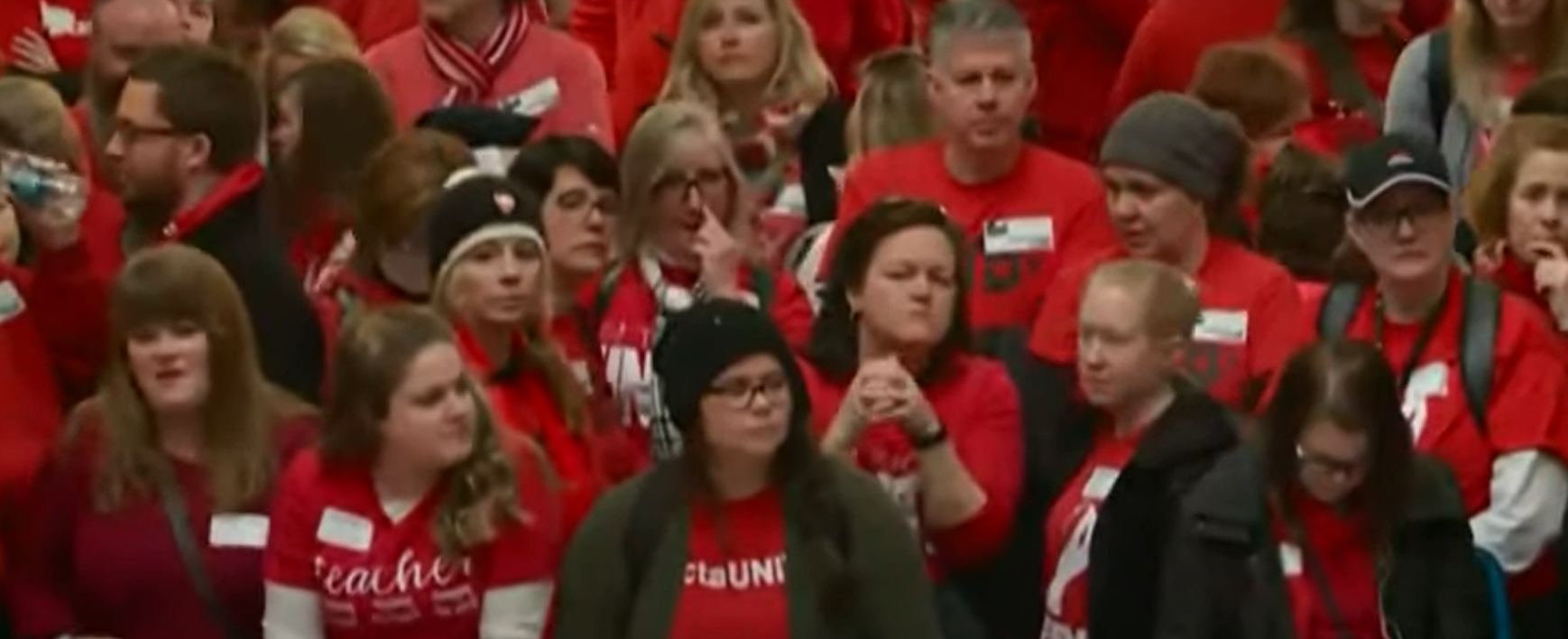The key issue of union leadership
By Richard Mellor in California
The practice of introducing poorer working conditions for new members of staff is nothing new to education workers or other public sector workers in Britain. It introduces a ‘two-tier’ system of staff pay and conditions and trade unions are rightly opposed to it. In republishing this article from the USA, it shows that it is not exclusively a UK issue, but part of a world-wide effort to worsen workers conditions at work.
Union membership has declined in the USA over the years to around 10% in 2020, according to the Bureau of Labour Statistics. Presently, 34% of public sector workers are members of unions but in the private sector the unionization rate has dropped to 6.3%. This difference is one of the reasons why the public sector has faced a fierce assault over the past period. The decline is not simply due to the power of the employers but the failure of the union hierarchy to organize resistance to it. The truth is that union leaders at the highest levels agree with concessions in general.
Teachers’ strikes in 2018
These figures are not a good sign, but there are still over 14 million workers in unions in key industries. In 2018, we witnessed a huge uptick in work stoppages and protests as teachers in West Virginia, Oklahoma, Arizona and other right to work or ‘red’ [Republican] states fought back against the assault on public education and their wages and benefits.
The state of Kentucky also experienced months of protests, demonstrations and in the first few months of 2019, teacher sick-outs [mass calls in sick] in Jefferson County, which includes Louisville. The sickouts forced the Jefferson County School District to cancel classes. The Jefferson County School District is the largest in the state and the 27th largest in the country.
Teachers, with the support of many of the parents, were not happy with the deal made between the union leadership and the school district on how ongoing protests should be organized, limiting sending three teachers from each school to the state capital. In Louisville and among the Black community in particular, there is a lot of anger at the education system and what we know as the school-to-prison pipeline.
The Jefferson County Teachers Association (JCTA) leaders opposed the sickouts and publicly condemned them. Brent McKim, in response to a request for the names of teachers that called in sick, called a press conference that included leaders of the Teamsters, AFSCME and SEIU, unions that represent workers in the public schools. In that press conference they publicly attacked what were the most militant section of the JCTA and their allies.
Teachers’ sickouts condemned
Sue Foster, representing AFSCME, said that many of her members lost wages without work and scrambled to find childcare because of the sickout. The Teamsters leader accused the teachers and their allies of “pimping” their employees for taking action (the sickouts) that the leadership opposed, and referred to them as a “rogue” group. In other words, rather than build on the militant section of the community and its tactics, they moved to suppress it.
In my opinion, what happened in Kentucky in 2018-19 was a perfect example of how a potentially powerful movement from below can be quelled, not by the power of the bosses, but by the failure, or conscious sabotage by the union leadership. There was ample opportunity for a state-wide movement to arise, which could have driven back the offensive against the teachers and working class communities, one that could have changed the balance of class forces nationally.
The union leaderships refused to take a public position against a gang ordinance proposal and link it to teacher’s issues, despite teachers and parents in the Black community urging them to do so. Gang ordinances and police violence are a crucial issue for parents and youth in these communities, and opposing the proposal, while explaining to the predominantly White poor of eastern Kentucky how this would strengthen and unite the movement as a step to overcoming racial divisions, would have increased the influence of working people in Kentucky as a whole.

Unwilling to wage a real fight
Instead, the union leadership claimed it would “split” the movement and weaken them. The real reason for this is that the union leadership is unwilling to wage a real fight against the assault on working people and instead they accept that concessions must be made. The union hierarchy is terrified of serious victories, because it will inspire millions of workers.
“The enemy was the collective spirit. I got hold of that spirit while it was still a seedling; I poisoned it, choked it, bludgeoned it if I had to, anything to be sure it would never blossom into a united workforce….” Confessions of a Union Buster: Martin Jay Levitt
Also, during this period there were miners occupying railroad tracks, demanding backpay the company owed them. This went on for weeks. In September 2019, workers were on strike at the GM plant in Bowling Green and workers from the Ford plant in Louisville were bussed out there to support them. These are pathetic gestures from the union hierarchy as a means of letting off steam and giving the impression they are doing something.
But there was no attempt whatsoever to unite these workers from different sectors of the economy or to build a powerful united working-class movement. In these struggles, what is happening in working class communities cannot be separated from the communities in which we live. The Greater Louisville Central Labor Council of AFL-CIO has over 50,000 workers affiliated to it, yet this potential power is never brought to the table.
Leaders playing same treacherous role
I return to Kentucky, because I see that the offensive is continuing, and the labour leadership is playing the same treacherous role. Facing stiff resistance from teachers against their attempts to undermine pensions back in 2018-19, the state is preparing to create a two-tier pension system that will mean that new hires after Jan 1st next year will have to pay more for their retirement and receive fewer benefits. And it’s important to recall that teachers are not eligible for social security benefits.
“This is all about new hires” says the bill’s sponsor, the lawyer and state Rep C. Ed Massey. Massey is a Republican who’s major in college was police administration, so we can see where he’s coming from. So whether it’s dividing us on race or colour, or immigrant against native born, men against women, old against young, foreign against domestic, the favourite tactic of moneyed interests and their political representatives in both parties is divide and rule.
Contrast this to the great US union slogan, “An injury to One is an Injury to all.” Most workers understand this in their gut, but the role of a leadership in countering management’s divisive strategy and organizing workers’ unity to defeat it is crucial.
However, the union leadership’s role in this instance hasn’t changed. It can’t change, as they are wed to their position by their world view, which is the same as the folks on Wall Street; when capitalism goes in to crisis the union leadership moves immediately to bail it out. A united workforce organized to fight back is an obstacle to this strategy.

Disgraceful statement from teacher union boss
The very same head of the Jefferson County Teachers Association who organized the press conference in 2019 to attack Jefferson County Teachers and parents, lets the enemies of working people know through the media that the union won’t stop the pension changes and throws the new hires and future generations to the wolves: “I think probably just about every teacher wishes the current plan could be left alone. But I also think the new plan is a reasonable attempt at finding common ground, because all of the stakeholders were involved in its development,” Lexington Herald Leader
The key statement here is “common Ground”. This disgraceful statement is an attempt to obscure his collusion with monied interests at the expense of working people and their families. His class collaboration is not isolated; the entire leadership of organized labour has the same world view, that we are ‘partners’ with the people who are attacking our living standards.
In contrast, activist and parent Gay Adelmann, acting president of the advocacy group Save Our Schools Kentucky told the Herald that,“Kentucky teachers should not let themselves be divided into a two-tier system, with older teachers enjoying traditional pensions and newer teachers paying more and working longer in the classroom…It’s a good way to divide and conquer,”.
It is indeed, and it has worked because the trade union leadership cannot do otherwise. To mobilize union and working-class power threatens the relationship they have built with capital and its representatives based on labour peace. To mobilize this power can only lead to chaos as far as the present leadership sees it.
Grass roots opposition
They leave individual union locals to fight what are global corporations isolated and alone. The bosses use the state, the courts, the media and the police, or other security forces to break strikes and grass roots opposition to the savagery of the market. No individual union or small group can counter this offensive alone. And at all times the unorganized workers have to be included in the struggle as the bosses will always use the unorganized against the organized.
Smaller union locals are democratic
What the folks in Kentucky are experiencing, we have all experienced. Defined benefit pensions are being phased out, the retirement age is rising. In auto, public sector, construction, throughout all sectors of the working class the same war is being waged. As far as organized labour is concerned, like it or not, any group or opposition caucus claiming to offer a way forward will find themselves in conflict with the present union leadership. An opposition program has to have more than simply calls for democracy.
Many of the smaller union locals are pretty democratic and taking the leadership of your own local is a crucial first step, but doing so on a program that takes us onto the offensive and speaks to what working people need, not just what the bosses, the trade union leadership and their friends in the Democratic party claim is ‘realistic’. It is important to not limit our campaigns to our own immediate workplace, trade or union affiliation.
Happening for a long time
The campaign to stop the present attempt to introduce a two-tier pension plan in Kentucky is important, but it is also important to recognize it has been happening for a long time and throughout the country. The Jefferson County Teachers Association is affiliated to the Kentucky Teachers Association which is a part of the National Education Association (NEA), the largest union in the US.
Any campaign of this sort must go beyond the immediate demands and have a strategy of drawing in other sectors, and that means appealing to the rank and file of other unions. We are in a war on two fronts; one is against the employers or management and the other against the concessionary policies of our own leaderships. We cannot avoid an internal struggle within our organizations.
The argument that there is ‘no money’ has no merit. There is too much evidence that the money is there. Just consider that the recent stock market news about the company Gamestop and the brokerage firm Robinhood led to investors raising $3 billion to rescue the company in three days.
The money is there, we just have to go get it.
From the US socialist website, Facts for Working People. The original can be found here.



